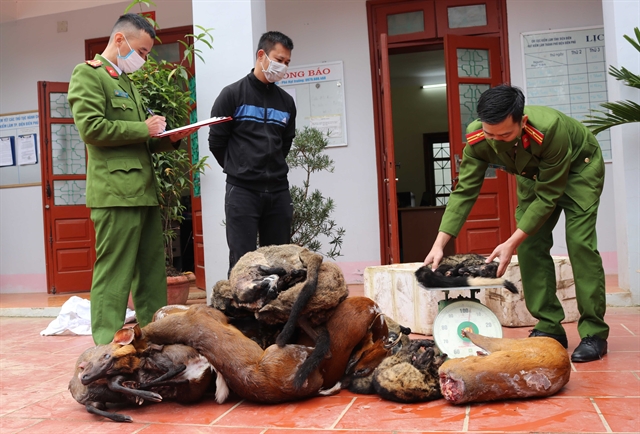 Environment
Environment


|
| Điện Biên Police in December 21, 2021, caught a man transporting several kilogrammes of frozen wildlife meat, including protected species, that was illegally obtained. — VNA/VNS Photo |
HÀ NỘI — The World Wide Fund for Nature (WWF) on Friday launched a communications campaign in Việt Nam, Laos and Cambodia to change the habit of consuming wildlife meat among urban people, highlighting the threats to public health and nature.
Văn Ngọc Thịnh, Director of WWF Việt Nam, said that Việt Nam, Laos and Cambodia were showing high levels of wildlife consumption, especially mammals and birds that are easily found in markets and restaurants.
He cited a survey by WWF and GlobeScan in 2021 in Việt Nam, Thailand, Japan, China and the US which showed that 7 per cent of the total people asked said that they or someone they knew had bought wildlife meat products at wildlife markets in the past 12 months.
"The consumption of wild animal meat severely degrades wildlife populations, causes cross-border and domestic crimes, and significantly increases the risk of zoonotic disease transmission," he said, stressing that most consumers are not aware of the potential risks that they, their family and the society face when buying bushmeat.
Meanwhile, according to Nguyễn Đào Ngọc Vân, WWF Việt Nam’s senior advisor for wildlife trafficking combat, the main reason for people to eat wildlife meat is they believe it is fresh and delicious, helping them show their social status, or improve their health. Through the campaign, the WWF hopes that the target group in particular and the public in general understand that wild animal meat consumption is not worth risking the health of themselves and the community.
Nguyễn Văn Long, Acting Director of the Department of Animal Health under the Ministry of Agriculture and Rural Development, said that there had been an increasing number of dangerous infectious diseases originating from wild animals that spread to humans such as HIV/AIDS, Ebola, MERS-Cov, COVID-19, Monkeypox.
According to the World Organisation for Animal Health (WOAH), in the last 60 years, 335 emerging diseases have occurred in humans, in which 144 pathogens (43 per cent) originate from wild animals.
Long said that in order to improve the State management efficiency in preventing and controlling dangerous diseases transmitted from wild animals to human, along with implementing recommendations from international organisations, it was necessary to review and supplement relevant legal documents, and foster the inter-sectoral collaboration among agencies involving in wildlife management, especially media agencies in popularising international and national regulations regarding wild animals, and raising public awareness of health risks during hunting, breeding, slaughtering and consuming wild animals for themselves and the community. — VNS




